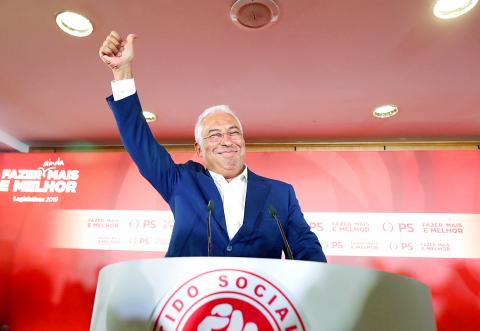Incumbent Portuguese Prime Minister Antonio Costa’s Socialist Party won a general election marked by low turnout on Sunday after presiding over a period of solid economic growth following years of austerity.
The Socialist Party (PS) took 36.65 percent of the vote, followed by the center-right Social Democrats (PSD) with 27.9 percent, near-total results from the Portuguese Ministry of Internal Administration showed.
That left the PS, which has governed for the past four years with the support of two smaller hard-left parties, with 106 seats in the 230-seat parliament, up from 86 seats in the outgoing assembly and just 10 seats short of an outright majority.

Photo: Reuters
Four seats still must be attributed, according to the results of votes cast abroad.
The election bucks the trend of declining center-left fortunes and the rise of far-right populist forces seen elsewhere in Europe.
A new far-right formation, Chega! or “That’s Enough!” entered parliament for the first time, but it won a single seat.
Turnout was 54.5 percent, the lowest level for a general election since Portugal returned to democracy after a decades-long right-wing dictatorship was toppled in 1974.
The question now is who Costa, 58, will pick as his allies.
After the last general election in 2015 in which the PS finished second, Costa convinced the Communist Party and Left Bloc to support a minority PS government, an unprecedented alliance that foes nicknamed the “geringonca,” or odd contraption.
During his victory speech Costa said he wanted to “renew this experience” of an alliance with the hard-left.
“The election shows that the Portuguese like the ‘geringonca,’ they like this political solution,” he said as supporters chanted: “Victory!”
“Stability is essential for Portugal’s international credibility and for attracting investors,” Costa said. “The PS will strive to find solutions that ensure this stability for the entire legislature.”
The Left Bloc, which won 19 seats just as in the last election, and the Communists, which won 12 seats, five fewer than in the last polls, said they were willing to once again back the PS.
A strengthened PS has more alternatives to get laws approved in parliament, political analyst Pedro Norton told public television broadcaster RTP.
“This is an incentive for it to govern alone, by searching for ad hoc agreements” to govern instead of forming a formal agreement, he added.
The election gave Costa another potential governing partner as the upstart People-Animals-Nature party, which has backed his budgets in the past, won four seats, up from just one.
Retired municipal worker Antonio Tavares, 76, said he voted for the PS, because the government raised pensions by 50 to 100 euros (US$55 to US$110) per month.
“It’s not a lot, it should be more, but that allows one to live more comfortably,” he said after casting his ballot in Lisbon.

A new online voting system aimed at boosting turnout among the Philippines’ millions of overseas workers ahead of Monday’s mid-term elections has been marked by confusion and fears of disenfranchisement. Thousands of overseas Filipino workers have already cast their ballots in the race dominated by a bitter feud between President Ferdinand Marcos Jr and his impeached vice president, Sara Duterte. While official turnout figures are not yet publicly available, data from the Philippine Commission on Elections (COMELEC) showed that at least 134,000 of the 1.22 million registered overseas voters have signed up for the new online system, which opened on April 13. However,

EUROPEAN FUTURE? Albanian Prime Minister Edi Rama says only he could secure EU membership, but challenges remain in dealing with corruption and a brain drain Albanian Prime Minister Edi Rama seeks to win an unprecedented fourth term, pledging to finally take the country into the EU and turn it into a hot tourist destination with some help from the Trump family. The artist-turned-politician has been pitching Albania as a trendy coastal destination, which has helped to drive up tourism arrivals to a record 11 million last year. US President Donald Trump’s son-in-law, Jared Kushner, also joined in the rush, pledging to invest US$1.4 billion to turn a largely deserted island into a luxurious getaway. Rama is expected to win another term after yesterday’s vote. The vote would

ALLIES: Calling Putin his ‘old friend,’ Xi said Beijing stood alongside Russia ‘in the face of the international counter-current of unilateralism and hegemonic bullying’ Chinese President Xi Jinping (習近平) yesterday was in Moscow for a state visit ahead of the Kremlin’s grand Victory Day celebrations, as Ukraine accused Russia’s army of launching air strikes just hours into a supposed truce. More than 20 foreign leaders were in Russia to attend a vast military parade today marking 80 years since the defeat of Nazi Germany in World War II, taking place three years into Russia’s offensive in Ukraine. Putin ordered troops into Ukraine in February 2022 and has marshaled the memory of Soviet victory against Nazi Germany to justify his campaign and rally society behind the offensive,

FRAUD ALLEGED: The leader of an opposition alliance made allegations of electoral irregularities and called for a protest in Tirana as European leaders are to meet Albanian Prime Minister Edi Rama’s Socialist Party scored a large victory in parliamentary elections, securing him his fourth term, official results showed late on Tuesday. The Socialist Party won 52.1 percent of the vote on Sunday compared with 34.2 percent for an alliance of opposition parties led by his main rival Sali Berisha, according to results released by the Albanian Central Election Commission. Diaspora votes have yet to be counted, but according to initial results, Rama was also leading there. According to projections, the Socialist Party could have more lawmakers than in 2021 elections. At the time, it won 74 seats in the